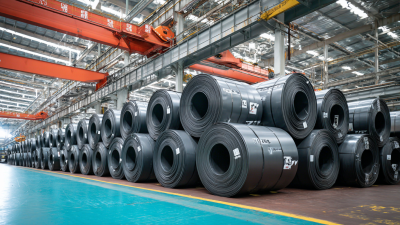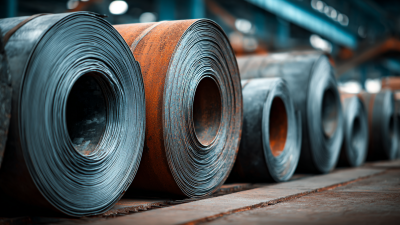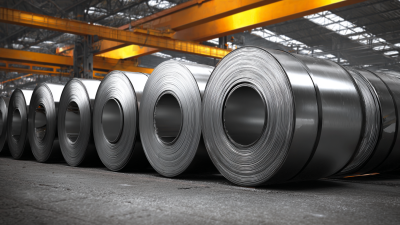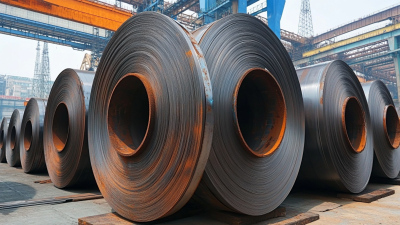In the realm of modern manufacturing, the utilization of Mild Carbon Steel Coils presents a myriad of advantages that are increasingly being recognized across various industries. These coils, known for their excellent formability and weldability, serve as a cornerstone in the production of numerous essential components, ranging from automotive parts to structural frameworks. As manufacturers strive for efficiency and durability, Mild Carbon Steel Coils offer an optimal balance of strength and flexibility, allowing for innovative design solutions while keeping costs manageable.
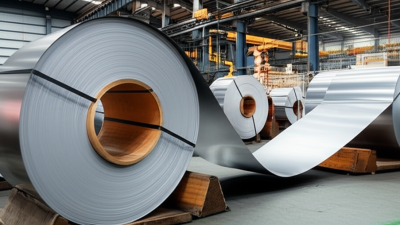
This exploration will delve into the benefits and practical applications of Mild Carbon Steel Coils, providing valuable tips for integrating this versatile material into manufacturing processes to enhance productivity and quality. By understanding the potential of this material, manufacturers can better leverage its properties to meet the ever-evolving demands of the market.
Mild carbon steel coils have become indispensable in modern manufacturing due to their excellent structural integrity and durability. These materials typically have a carbon content ranging from 0.05% to 0.25%, which contributes to their ability to withstand significant stress while maintaining flexibility. According to the World Steel Association's data, mild steel accounts for approximately 80% of global steel production, underscoring its widespread application in various industries. The combination of strength and ductility in mild carbon steel makes it ideal for creating components that are both load-bearing and resistant to deformation.
**Tip:** When selecting mild carbon steel coils for your projects, carefully consider the specific grades available, as they offer different levels of tensile strength and yield strength, which can impact your final product's performance.
The durability of mild carbon steel also plays a vital role in reducing maintenance costs and extending the lifespan of manufactured goods. A study conducted by the American Iron and Steel Institute (AISI) highlights that components made from mild carbon steel can last over 50 years with proper treatment against corrosion. This longevity is essential for sectors requiring reliability, such as construction and automotive manufacturing.
**Tip:** To enhance the durability of mild carbon steel, consider applying protective coatings or treatments that can mitigate corrosion and oxidation, thereby improving the material's resilience in harsh environments.
Mild carbon steel coils have become a vital component in automotive manufacturing, offering a blend of strength, formability, and cost-effectiveness. According to a recent report by the Global Automotive Steel Market, mild steel accounts for nearly 30% of the total material used in car bodies, underscoring its importance in producing lightweight yet durable automobiles. This material allows manufacturers to create complex shapes and forms, facilitating more innovative vehicle designs while adhering to safety standards.
The automotive industry is increasingly leveraging advanced mild carbon steel coils in various applications, such as chassis and body panels. The automotive sector is anticipated to grow at a CAGR of about 5.6% through 2027, leading to a rising demand for sustainable and efficient manufacturing practices. Utilizing mild carbon steel not only enhances fuel efficiency due to reduced vehicle weight but also ensures recyclability, which aligns with the industry's shift toward sustainability. As technology advances, the development of high-strength mild carbon steel products further positions manufacturers to meet both performance and environmental goals.
Mild carbon steel coils have established themselves as a cost-effective solution for mass production in various manufacturing sectors. According to a report by the World Steel Association, mild steel accounts for approximately 90% of all steel produced globally, highlighting its significance in the industry. The inherent properties of mild carbon steel, including excellent ductility and weldability, make it an ideal choice for producing a wide range of products, such as automotive components, appliances, and construction materials, all at a reduced cost.
Furthermore, the average cost of mild carbon steel coils is notably lower than that of high-grade alloys, often around 20-30% less per ton. This significant price advantage translates into reduced production costs, allowing manufacturers to increase their profit margins while remaining competitive in the market. A study by Smithers Pira indicated that utilizing mild carbon steel in mass production processes not only speeds up the manufacturing cycle but also minimizes waste material, further contributing to overall cost savings. As industries continue to seek economically viable materials, mild carbon steel coils will remain a cornerstone for efficient manufacturing strategies.
Mild carbon steel coils have emerged as key players in modern manufacturing, not only for their mechanical properties but also for their environmental sustainability. According to a report by the World Steel Association, steel recycling contributes approximately 10% of the global steel production input, highlighting the importance of mild carbon steel in achieving sustainable manufacturing practices. These coils are typically composed of 0.05% to 0.25% carbon, making them easily malleable and suitable for a variety of applications while ensuring that they remain recyclable.
The production process for mild carbon steel is also evolving to be more environmentally friendly. Recent advancements in technology have led to the development of electric arc furnace (EAF) methods, which produce steel using recycled materials and substantially reduce carbon emissions. According to data from the International Energy Agency (IEA), EAF technology can emit up to 75% less carbon dioxide compared to traditional methods. Moreover, the lifecycle analysis of mild carbon steel indicates that its environmental footprint can be minimized through responsible sourcing and efficient use, further solidifying its role as a sustainable choice in the construction and automotive industries.
Mild carbon steel coils are increasingly recognized for their versatility and cost-effectiveness in modern manufacturing, particularly in applications like exhaust system construction. Recent technological advancements have enhanced the performance characteristics of these steel coils, making them suitable for high-stress environments. For instance, studies indicate that the strength-to-weight ratio of mild carbon steel has improved due to innovative alloying processes, allowing manufacturers to create thinner, lighter components without compromising durability. This is critically important for reducing overall vehicle weight, thereby enhancing fuel efficiency.
Moreover, the integration of advanced coatings and plating techniques has significantly increased the corrosion resistance of mild carbon steel coils. The automotive industry has seen a marked improvement in exhaust system longevity, with life expectancy extended by up to 30% thanks to high-temperature resistant coatings. Industry reports suggest that the global demand for mild carbon steel in automotive applications is projected to grow by 5.6% annually, driven by these enhancements. As manufacturers continue to explore these advanced materials, the potential for mild carbon steel coils to revolutionize various sectors within manufacturing becomes increasingly evident.
| Dimension | Value |
|---|---|
| Thickness Range | 0.5 mm - 12 mm |
| Typical Applications | Automotive, Construction, Appliances |
| Weight per Coil | 0.5 tons - 3 tons |
| Yield Strength | 200 MPa - 300 MPa |
| Ultimate Tensile Strength | 330 MPa - 400 MPa |
| Corrosion Resistance | Low (Requires Coatings) |
| Welding Characteristics | Excellent |
| Technological Advances | Enhanced Coating Technologies, Improved Formability |
